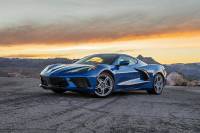2022 Consumer Reports Auto Reliability: Hybrids Come Out on Top, While Mercedes Hits Bottom
The annual Consumer Reports Auto Reliability Report just published, with some surprising results along with some you’d expect.
With only the rare exception, hybrid vehicles are some of the most reliable vehicles on the road, according to the Consumer Reports Annual Auto Reliability Report. But the report also delivered some cautionary notes for those looking at EVs, which didn’t fare very well due to a variety of problems.
And perhaps the biggest surprise in the study? The poor showing by Mercedes-Benz, which ranked at the bottom of the reliability chart.
If you’re looking for a new car, truck, or crossover, odds are that reliability is one of the most important factors on your shopping list. And the Annual Auto Reliability study from Consumer Reports serves as a road map for many buyers.
The 2022 study — based on what 300,000 owners had to say about their vehicles — provides some interesting insight into how the latest products are holding up.
2022 Consumer Reports Annual Auto Reliability Report
 Of all the vehicles included in the yearly report, hybrids ranked highest, with midsize and large sedans right behind. As for all those new battery-electric and plug-in vehicles that have come to market lately? Buyer beware, said Auto Testing Director Jake Fisher.
Of all the vehicles included in the yearly report, hybrids ranked highest, with midsize and large sedans right behind. As for all those new battery-electric and plug-in vehicles that have come to market lately? Buyer beware, said Auto Testing Director Jake Fisher.
High Tech = Low Reliability
Plug-based vehicles “are designed for early adopters,” he explained, “and (manufacturers) are loading them with lots of the latest technologies.” In general, the latest technologies, like gesture controls, voice recognition, and advanced driver-assistance systems, tend to cause the biggest headaches for buyers, the Consumer Reports study revealed.
“Every car buyer needs to weigh how important it is to be the first with a new technology,” said Fisher in an exclusive interview with GearJunkie.
“The one bright spot,” he added, is that it’s a lot easier for an automaker to fix and replace software than a defective mechanical part, such as a balky transmission. And more and more new products are being introduced with the ability to make smartphone-style over-the-air updates. Tesla recently used OTA technology to fix a brake problem without requiring customers to bring their vehicles in for repairs.
Aren’t Hybrids High Tech?
Now, you may be asking why hybrids are the exception. After all, they combine both electric and gas drivetrain systems under the hood. But that technology hasn’t really changed all that much since the first hybrids — like the Toyota Prius — came to market 2 decades ago.
And some of the most popular hybrids are produced by brands that routinely score at the top of the quality and reliability charts to begin with, including Lexus and Toyota, said Fisher. But it’s interesting to note that the hybrid version of the new Ford Maverick scored higher than the version of the pickup using a conventional gas engine.
As for EVs, the industry is still dealing with “growing pains and working out the bugs,” he added.
 Tesla & Non-Tesla
Tesla & Non-Tesla
Think of battery-electric vehicles as falling into two categories: Tesla and non-Tesla models, said Fisher. Products like the Hyundai Kona, Chevrolet Bolt, and Volkswagen ID.4 suffered from a variety of technical issues, owners reported, including faulty battery packs, unreliable charging, and problems with their electric heaters.
Curiously, Tesla vehicles had few issues with their powertrain technology. The upstart automaker had problems with things like peeling paint and misfit body panels, said Fisher, the sort of issues traditional automakers have largely solved.
Of the four Tesla products now on the market, the Model 3 sedan was the one that showed the highest level of reliability overall. Overall, the California-based EV company ranked in the bottom third among the 24 automakers the CR study covered.
Mercedes Takes a Tumble
When it comes to the most reliable brands, the 2022 Auto Reliability Report didn’t stray far from what Consumer Reports found in years past. Toyota ranked highest, followed closely behind by the Japanese automaker’s luxury sibling, Lexus. BMW, Mazda, and Honda rounded out the top five. Lincoln was the only Detroit brand in the top ten, though Buick came in at eleventh.

Perhaps the biggest surprise, according to Fisher, was the poor performance of German luxury brand Mercedes-Benz which was dead last among the 24 brands covered by the CR study. The testing chief blamed Mercedes’ focus on using the latest technologies to help differentiate itself from its competitors. Features like the Hyperscreen — which covers the instrument panel of the S-Class sedan from pillar to pillar — may appeal to early adopters, said Fisher, but they tend to be more trouble-prone.
Ironically, Mercedes’s arch-rival BMW made it into the top three brands this year for the first time ever. While the Bavarian automaker long focused on cutting-edge technologies, it has backed off from that strategy over the last several years, according to Fisher. And it’s worked to fix features like its once problem-plagued iDrive system. As a result, consumers are finding the latest BMW products to be among the most reliable on the market.
The post 2022 Consumer Reports Auto Reliability: Hybrids Come Out on Top, While Mercedes Hits Bottom appeared first on GearJunkie.

